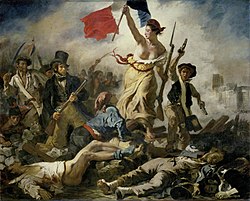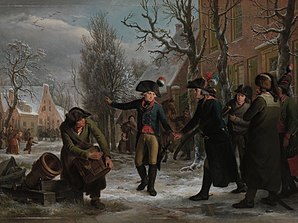| Atlantic Revolutions | |
|---|---|
| Part of the Age of Revolution | |
Clockwise from top:
| |
| Date | 22 March 1765 – 4 December 1838 (73 years, 8 months, 1 week and 5 days) |
| Location | |
| Caused by | |
| Resulted in | Multiple revolutions and wars across the Atlantic world, including the American Revolutionary War, French Revolutionary and Napoleonic Wars, and the Spanish American wars of independence |
| Part of a series on |
| Political revolution |
|---|
 |
|
|
The Atlantic Revolutions (19 April 1775 – 4 December 1838) were numerous revolutions in the Atlantic World in the late 18th and early 19th century. Following the Age of Enlightenment, ideas critical of absolutist monarchies began to spread. A revolutionary wave soon occurred, with the aim of ending monarchical rule, emphasizing the ideals of the Enlightenment, and spreading liberalism.
Other revolutions in West Africa emphasized forms of Islam that were egalitarian in comparison to traditional forms.[1]
In 1755, early signs of governmental changes occurred with the formation of the Corsican Republic and Pontiac's War. The largest of these early revolutions was the American Revolution beginning in 1775, which founded the United States of America.[2] The American Revolution inspired other movements, including the French Revolution in 1789 and the Haitian Revolution in 1791. These revolutions were based on the equivocation of personal freedom with the right to own property — a concept spread by Edmund Burke — and on the equality of all men, an idea expressed in constitutions written as a result of these revolutions.
- ^ Getz, Trevor. "READ: West Africa in the Age of Revolutions". Khan Academy. Retrieved 2024-04-19.
- ^ "Timeline of the Revolution". nps.gov.



